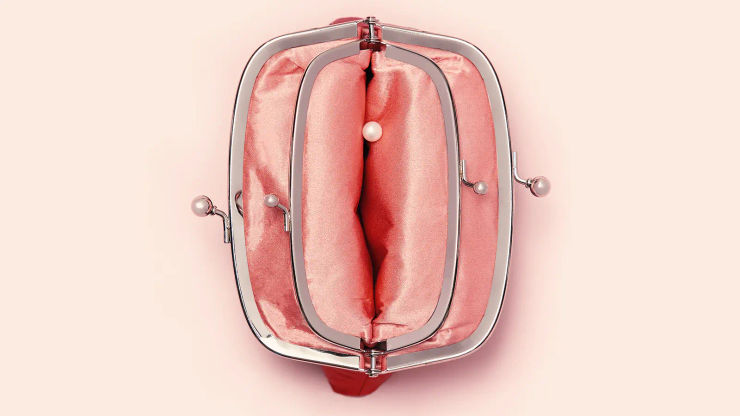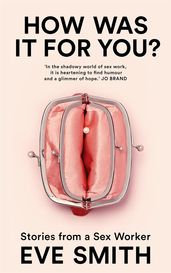Sex work: perception vs my reality
Eve Smith, author of How Was It for You? Stories from a Sex Worker, challenges commonly held views about the sex industry.

In How Was It for You? Eve Smith (a pseudonym) invites us to see the sex industry from an insider’s point of view. Honest, eye-opening, full of fury and frequently funny, her memoir gives us a unique insight into life as a sex worker. Here, she offers an alternative view on some regular claims made about her job, based on her own experiences.
This piece contains some explicit language and sexual content.
Perception: Sex work is degrading
My reality
You know what I find completely degrading? Having no money. Searching through the yellow labels at a supermarket, making a tin of beans last for two meals, having letters through the door with interest rates that are rising when you can’t even afford the minimum payment that you owe.
And you scrub toilets, you clean floors, you glass collect with your eyes fixed to the floor looking for spare change the drunk partiers have dropped. You stand on factory lines until spider veins sprout on your legs forcing you to invest in support stockings and you are only twenty-two. . . Sleeping on a sofa as you can’t afford to get a room, let alone a flat of your own.
And there is no bank of mum and dad.
After all that, having a man come on your tits a few times a day isn’t so bad. And I could afford to eat, and pay rent. I had an accountant. I paid tax, whilst paying off my drama school debt. I have to say, that felt wonderful.
‘Sex work is often seen as so degrading it isn’t even called work. But most of the people who think this way have never scrubbed toilets in horrible conditions for awful employers and minimum wage; have never experienced the level of humiliation that can be found in what is considered 'acceptable' work.’
Sex work is often seen as so degrading it isn’t even called work. But most of the people who think this way have never scrubbed toilets in horrible conditions for awful employers and minimum wage; have never experienced the level of humiliation that can be found in what is considered 'acceptable' work. The radical feminists refuse to say work, or sex work, instead calling it prostitution and us prostitutes. But at the same time we also get the easy money trope thrown at us. So which is it? Too terrible to be work or too easy to be work? Are we crying in a corner with a line of men waiting to rape us or are we just lying back thinking about England?
Perception: Sex workers don’t enjoy the sex
My reality
Sometimes I didn’t. Sometimes I did. It all depended on how I was feeling at the time.
Was I horny? Did the shape of his cock agree with the shape of my vagina? Was he good at giving me head? Was he pleasant to talk to? The looks of the man were irrelevant. What was crucial though was that the man wanted me to experience pleasure.
It’s a funny thing. You would think that the men in brothels would be selfish, just taking what they wanted. But the exact opposite is true for many of them. They might be paying for a service but that seems to make it more important that I, the woman, am enjoying it. Because if I’m not, well, that leads to thoughts of exploited women, pimps and desperation. Which most punters don’t want to think about when they’re having a shag.
So they put the effort in, far more than the average man one might meet at a nightclub or from an online date.
I orgasmed a lot. If that’s not enjoyment in work, I don’t know what is.
Perception: Criminalising the buying of sex will help sex workers
My reality
Ha. If by helping you mean making us all more vulnerable and more skint. Obviously, criminalising the purchase of sex affects our livelihoods, but more importantly it affects our lives – and potential deaths. In the countries that have implemented it, statistics suggest that violence against sex workers has gone up, with sex workers feeling more fearful, marginalized and stigmatized.
‘If you’re violent towards women, the fact that buying sex is illegal isn’t likely to put you off doing it.’
If you’re violent towards women, the fact that buying sex is illegal isn’t likely to put you off doing it. But it will put off others, who have no intention of causing harm. Fewer clients mean being forced to see people we normally wouldn’t, take more risks, and work in more isolated places. I am not sure I would describe this as helpful.
Perception: All sex work is the same
My reality
You see a woman you assume is a hooker entering a hotel. Short skirt, smeared makeup and high heels click clacking as she walks to the lift.
Observe another woman already in the lift. Daisies on a dress that touches her knees and sandals. A large bag in her hands. That woman is me.
I might be about to give a couple a very fun time, playing with her whilst the man watches. Or I could be about to wrap Graham the headteacher in cling film before I make a hole over his mouth and pee into it. Or I could be about to film content of me masturbating for a few of my regs.
You can’t assume anyone is or isn’t a sex worker, and you can’t ever assume you know what goes on behind a bedroom door.
However, in its most basic interpretation all sex work really is the same: we all get paid to make people horny. So to those who work in the sex industry but think that they don’t – don’t you dare think you are better than a woman selling sex just because you stay fully clothed, or don’t let anyone touch you. We should be supporting each other. We have enough to deal with already without women in our profession placing us all in a whorarchy.
How Was It For You?
by Eve Smith
From the pool sides of private Caribbean villas where the nation’s wealthiest spend their downtime, to strip clubs, brothels, and online platforms: wherever sex is being sold, ‘Eve’ has been there. Now, she’s ready to tell her story of what selling sex is really like – the good, the bad, and the hilarious. A compelling and candid anonymous memoir about the reality of working in the sex industry in Britain, How Was It for You? is a book everyone will be talking about this year.



